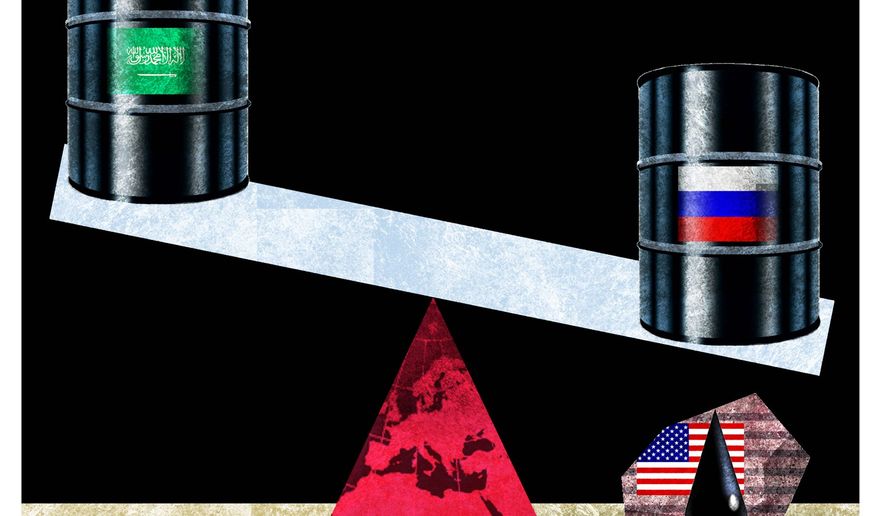OPINION:
President Trump was correct to intervene and stop the oil price war between Saudi Arabia and Russia in order to protect America’s shale oil producers. However, understanding the underlying motivations behind the Saudi leadership’s energy policy is critical to global energy security in general and American national security in particular.
Ever since the historic meeting between President Roosevelt and King Abdulaziz onboard the USS Quincy on Feb. 14, 1945, the U.S.-Saudi alliance has been anchored in the mutual strategic objective of uninterrupted exploration, production and transportation of oil resources from the Middle East to markets around the world.
This underlying geopolitical goal of being a responsible and reliable partner in the global energy markets remains the core motivating mission of the current Saudi rulers, King Salman and Crown Prince Mohammad bin Salman (MBS). As the world’s largest oil exporter, Saudi Arabia understands that it is responsible for the well-being of the global economy. President Trump and his foreign policy team understand that Saudi oil energizes the world.
As such, despite what some in Congress have suggested, the fundamental reasons behind Saudi Arabia’s recent attempts to increase production was not to harm America’s shale producers but instead, it was to prevent Russia from destroying America’s shale oil/gas industry. Sadly, Russian President Vladimir Putin has a penchant for using his country’s energy resources as a weapon against his enemies. This irresponsible behavior was on full display in the winter of 2009, when Moscow cut off natural gas supplies to the people of Ukraine.
In fact, in early March Saudi Crown Prince Salman proposed cuts of 1 million barrels per day to global oil production but Russia refused because Mr. Putin has taken the daggers out and is aiming it straight at U.S. shale producers. Why? Because every barrel of U.S. export to Europe is a dollar Russia is denied in mischief making across the world. Again, President Trump is correct: The United States is fortunate to have Saudi Arabia as an ally in keeping oil markets stable.
Another motivating factor behind Saudi oil policy is to ensure that it does not give up market share to competitors. This is the most natural response for any company including Saudi Aramco. Just as Amazon and Walmart compete for the $4 trillion online e-commerce market, so does Saudi Aramco have to compete with Russia, its closest rival.
It is indeed in America’s best interest that Saudi Arabia maintain and even increase its market share over Russia because while the dollars earned by Riyadh are directed towards implementing the domestic reforms enunciated by King Salman and MBS, Russia’s extra dollars land in places like Caracas and Tehran to prop up immoral thuggish regimes.
Another less known but equally important factor motivating Saudi oil policy is the continued threats from the Islamic regime of Iran. For more than 40 years Saudi Arabia has had to endure the virus of Khomeinism, the Shiite version of the Muslim Brotherhood ideology advocated by the late Ayatollah Khomeini. In fact, one of the core tenets of the Islamic regime has been to overthrow the Saudi monarchy.
Today this goal continues unabated. In November of 2019, Iran’s Intelligence Ministry threatened employees of Iran International TV with death threats. The Guardian has reported that the TV station “is being funded through a secretive offshore entity and a company whose director is a Saudi Arabian businessman with close links to the Saudi crown prince Mohammed bin Salman.” And last September saw the most brazen attack yet on Saudi Arabia: The drone attacks by Iran’s Revolutionary Guard Corp on the heart of Saudi Arabia’s oil industry, thus threatening the global energy markets. In fact, the IPO of Saudi Aramco would most likely have had more institutional interest from American investors had it not been for the Khamenie-supported terror campaign against a U.S. ally.
Therefore, to the extent that Saudi Arabia can deny Iran’s rulers money that supports their nefarious activities in the Gaza Strip, Yemen, Bahrain, Lebanon, Syria and Iraq it has done the world a favor. Every dollar that Riyadh denies the terrorist regime in Iran by lowering the price of oil through increased production limits the ability of Ayatollah Khamenei to destabilize the energy rich Middle East.
Of course, just like President Trump, Crown Prince Salman draws a distinction between the people of Iran and their tormentors. Saudi rulers know that the people of Iran are deserving of a better future. In fact, Mohammad Al-Sulami a highly respected adviser to MBS, has written extensively about Iran’s rich culture and heritage. And herein lies the answer to resolving Saudi Arabia’s and, by extension, America’s security dilemma: Supporting the people of Iran in their struggle against the regime of Ayatollah Khamenei.
The timely intervention of Mr. Trump to save America’s shale industry and stabilize the global oil markets could not have happened without the full cooperation of America’s longtime ally and friend Saudi Arabia. As with any solid alliance, there has been and will continue to be ups and downs in Washington’s relations with Riyadh, but the durable legacy of the Roosevelt-Abdulaziz meeting has endured the test of time. The United States is fortunate to have Saudi Arabia as its reliable partner in maintaining global energy security.
Correction: An earlier version of this op-ed included a line that suggested Iran International TV received financial support from the government of Saudi Arabia. Iran International says it has no connection to any governments, including Saudi Arabia and Iran.
• S. Rob Sobhani is CEO of Caspian Group Holdings.




Please read our comment policy before commenting.